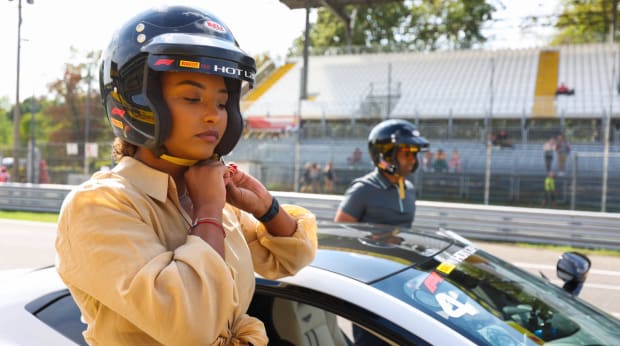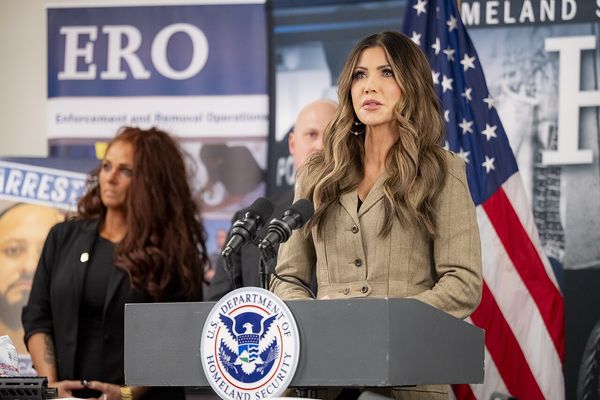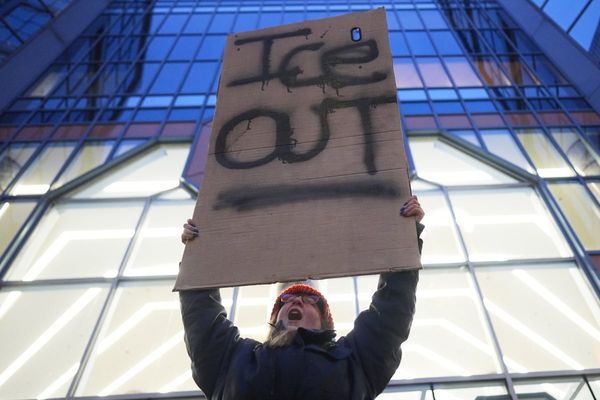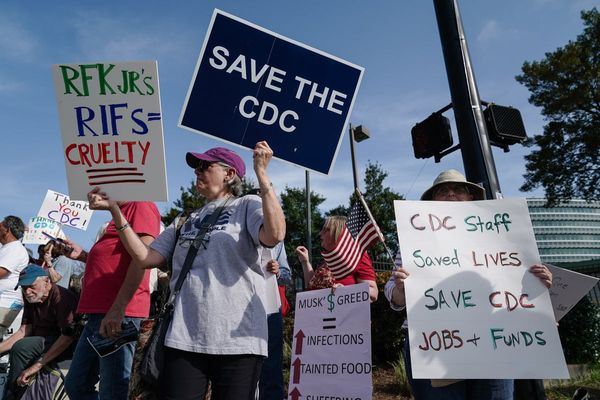For many, Naomi Schiff’s presence in the F1 paddock might feel like it’s come out of nowhere. She made her debut as a Sky Sports analyst in 2022 and instantly hit it off with the audience as a knowledgeable figure and fresh face with great opinions and anecdotes. However, the reality is that Schiff has always been working hard behind the scenes.
She spent her youth as a racing driver, gained experience managing sales within motorsport teams and qualified for the inaugural season of W Series, but she was finally given the platform she deserved by Sky Sports. Now in her second year with the team, the Belgian-Rwandan star chats about the upcoming British Grand Prix, the challenges of her career to date and skipping school to meet Lewis Hamilton.
The following has been lightly edited for clarity.
Sports Illustrated: Growing up, your dad was a racing driver. However, you have stressed in the past that he didn’t push you into it. In that case, how did you get the motorsport bug?
Naomi Schiff: When people ask me how I got into racing, I don’t start by saying my dad was a racing driver, because that would be a false narrative. I was invited to an indoor go-karting birthday party of a family friend and I just loved it. I was very competitive, and competed in sports at school, mostly swimming but judo and a little bit of athletics. Motorsport was never on my radar, at all. I went through my dad’s photo album of all his racing and he would watch F1 every weekend, but I didn't really get it. Then I got invited to this go-karting and I loved the actual elements of driving, plus I was quite good at it. I begged my dad to take me back because I was devastated that the day was over. People at the local indoor karting place said I should do something more about this, because I seemed to have a natural talent for it. But, my dad was concerned because I was so young.
If you look at motorsports, traditionally, it's not a sport that’s very welcoming, or doesn't seem to have a lot of opportunities for women. It was also very expensive, so he just wanted me to show a level of commitment to it before he invested too much money. Instead of buying me a go kart, he bought himself one and I just went around with him to a lot of tracks! Seven months after that birthday party, he bought me my own go kart, then we started testing properly for my first season of racing.
SI: You grew up in South Africa, which last hosted an F1 race in 1993. However, the Kyalami Grand Prix Circuit is still used for other events, and I understand you skipped school one day to go and meet one of your idols at the track. Is this true?
NS: So I didn't skip school, I was at school and left. It was 2010, and Lewis Hamilton was still with McLaren. The first year that I started racing was the same year that Lewis got into F1, so he was almost immediately the person that I looked up to. My dad had already been watching his career in junior formulas and he said to me, ‘watch this kid, he's going to be so good’. When I was that young, there weren't a lot of identifiable role models and Lewis was quite obviously that person for me. I always say that he wasn't exactly like me, but he was something like me and that was all that I was looking for.
There were two kids in my school that also raced and one of them came up to me and said that Lewis was at Kyalami and it was 20 minutes away. I called my dad and asked if I could go, he told me go home, get your helmet and get your business cards. I went to the front desk, told them the truth, and they understood that for us it was a once-in-a-lifetime opportunity. We went to the track, but it was a closed off event. So we went and stood at a fence for a while, trying to see if there was anyone we could flag down to say that we’re young racers and this is the person who inspires us. We got a team member to come over and they told us to hang around, and he’ll come over. When Lewis saw us, he said to open the fence because he wanted to go talk to us and he came to our side. He spent at least 10 or 15 minutes with us out of his schedule. It was great and I smiled for four days straight after that. He signed my helmet and my school uniform, but it's kind of funny to see where we are today.
SI: The two of you now seem to be good friends, and you did an interview on Sky Sports last season where you showed him the photos from that day. Did you keep the items that he signed?
NS: I’ve got the helmet. My mom probably has the school T-shirt. We had his signature covered with clear paint to make sure that it wouldn’t fade!
SI: You mentioned that you had friends at school who raced. Did any of your other older friends have an interest in motorsport?
NS: None of my friends are into motorsport. I think one of the issues with motorsports is that it’s not a sport that a lot of people are exposed to. It's not a sport that you hear about or play in school. It’s quite far removed from everyone’s understanding, especially at a young age. I started racing in Year 7, which is the last year in South Africa of primary school, and when I got to Grade 8, I struggled to hang out with people my age. I was already in an environment where I was dealing with adults about setup and engineering and traveling the world, so I grew up very quickly in the space of that year or two. My immediate friends, I found them a little bit hard to relate to at that time. It was very difficult because you practice on a Friday, you race on a Saturday and a Sunday, and so that's your weekend gone. Every single day after school I was in physical training, so we were going through very different things in that phase of life. I was also into makeup and boys, but I had a professional career on the side of that. Now, thanks to Netflix’s “Drive To Survive”, and the way that the sport has changed, all of my girlfriends love motorsport. Finally, I can say that I’ve been the coolest person they have known, not just now, but it just took them some time to catch up!

Glenn Dunbar/LAT Images/IMAGO
SI: W series, the all-women racing series, was a huge part of your career. Both in terms of the opportunity to race on such a big stage, but that you took on more of a front facing role and started presenting. Could you talk to me a bit about your time there, please?
NS: W Series came into my life at a time where I desperately needed it. I had signed a contract with a team, I won’t go into the details of it because it ended bitterly, but a team that I thought was going to change my career. It was the first time that I was a factory driver, which is something every young driver strives for. You become a factory driver, when you race for the likes of Audi or BMW or etc. I managed to bag a contract with a team but they didn’t really give me a great opportunity. I think they lost most of their backing quite early on and so it ended dismally. For a long time, I had decided it was never going to happen for me; I completely let go of my dream. I was very complacent, stuck in my life with them as I was in a contract that was five years long, and I could not get out of it. So I started putting my focus to other things. I was working in their sales team, I was managing their race team and a couple of championships. I thought that this could be my future, and I thought that if I’m not going to be Lewis [Hamilton] then at least let me be Toto Wolff [team principal at Mercedes-AMG PETRONAS F1].
Then in 2018, I got an opportunity to race. One of the bosses of a manufacturing company said to me, ‘I can’t race my car in this championship, because I'm too busy. Can you race it?’ That was the first time in like four years that I was allowed to race a full season in a championship, and I won it. That to me was a real wake up call: You still got it. I panicked, and thought I will have so many regrets if I don’t keep chasing my racing career. And just like that, W Series dropped out of the sky. That was the beginning of a whole new chapter.
The driving itself was quite challenging, because I hadn’t raced formula cars for six years. I had no budget to go testing, so I showed up to the first race and I was just playing catch up. From a driving perspective, I didn’t love the season because I felt like I was turning up, for lack of better words, to a gunfight with a spoon. I just wasn’t prepared, and I couldn’t raise the funding to get prepared. So it was very frustrating. That was when I realized that there was more that I could do with my career in terms of representation and how important it is to inspire the next generation. W Series hired me to be the diversity and inclusion ambassador and I also worked for them in their commercial departments selling sponsorships. Then the coronavirus pandemic hit three months later, and that completely changed the game. I wasn’t able to roll out any of the projects that we had planned like bringing school girls to our races and doing proper workshops on all the different roles that were available in the world of motorsport for young women.
They suggested that I become a pundit on their broadcast for 2022, and I’m so grateful to them for believing in me and trusting you to do that. Then I got the call from Sky Sports at the end of that year. They really gave me the platform to show what I could do.
SI: How did you find the transition to Sky Sports, because it’s such a huge platform and for some of their audience, they weren’t familiar with you and your racing career?
NS: It was definitely a huge transition. First of all, because all of a sudden, I found myself where I always wanted to be. F1 was always my goal and although I planned to be there as a driver, I got there in a different shape and form which is fine. That was the most mind-blowing thing to me. I've been through so many difficult things in my career, and this opportunity showed up when I was ending my career as a racing driver; it helped me to avoid an identity crisis! There was also an enormous sense of responsibility to give back to the people who’ve invested in your career. Obviously there are also challenges that come with it, like I’m not a trained broadcaster. You spend a lot of time behind the camera being interviewed so I’m quite an extrovert, and I’m not shy of the cameras. Coming into it as someone that maybe a lot of people didn’t know of before, I’m really having to get to know people and gain people’s respect. My colleagues have been a massive help, a lot of them have been doing this for 12 years. I’m really grateful to be a part of their team, because they just have so much knowledge and so much value that I can learn from. I’m genuinely working with the best people in the industry.







